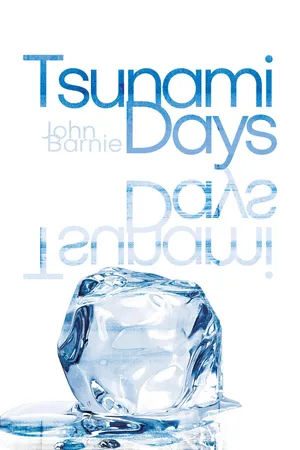Tsunami Days
About this book
"We need more writers with bite. We have lived in the flatlands too long," writes John Barnie in one of his 'observations' ('Art in the Flatlands'). And bite he delivers.
Ranging across politics, history, culture, ecological disaster, the meaning of truth, poetry, what we mean by identity and more… Barnie shares a window onto the world that is both erudite and particular. Leaning towards pessimism in a darkening world, these observations are often provocative, not from any bullish desire to antagonise, but as the result of mining a rationalist line of thought with an honesty and consistency that is applied as much to the author as to his subjects. There is a clarity here that some may find uncomfortable, but the aim is always dialogue above agreement; intellectual engagement above cheap solutions and sentimentality.
Barnie asks us to think, consider and dig deeper, but most of all he asks that we "…live richly among our secondary self-created meanings, while recognising them for what they are. To face without flinching the nullity of the great void." ('Varieties of Meaning')
Tsunami Days is a vital collection of essays for those prepared to engage with its unflinching observations.
Tools to learn more effectively

Saving Books

Keyword Search

Annotating Text

Listen to it instead
Information
Table of contents
- Contents
- Title Page
- Copyright
- Acknowledgements
- By the same author
- Epigram
- Half Title
- Foreword
- Delight in Killing
- Against Great Men
- The Elephant in the Room
- Canute the Environmentalist
- The Pattern in the Leaf
- What Do We Really Feel About Nature?
- A New Dark Age
- Lying in Politics
- The Attraction of War
- The Problem of Religion
- Poetry on Trial
- Contempt for Truth
- Would-Be Dictators
- Revolution’s Allure
- Weepy Culture
- Religion of Blood and Delusion
- Centres and Peripheries
- Democracy Betrayed
- Tribulations of a Meat-Eater
- Footprints in the Snow
- The White Man as Burden
- Where Do We Go Next?
- Escape into Technology
- Truth v. ‘Truth’
- Art in the Flatlands
- The Masters of Infinity
- Poetry as Fly-Fishing
- Where Is My Nation?
- The Relentless Cycle
- Money and Power
- Varieties of Meaning
- Sauve Qui Peut
- Embracing Delusions
- Collapse
- The False Shepherd
- Down Among the Struldbrugs
- The War-Making Species
- No Bribes Here
- Facing the Bottleneck
- Cinema of Dreams
- The Island
- Dance of the Mayflies
- Life in New Eden
- Mr Zimmerman and Mr Jones
- White Power/White Justice
- Defeat and Lies
- The Flaw
- Learning from Conrad
- The Meaning of a Book
- The Freedom of Being Someone Else
- The Monk and the Rag-and-Bone Man
- Negative Capability
- Appropriate Anger
- Varieties of Criticism
- Cloud Shadows
- Men of Destiny
- The Twisted Tree
- On the Brink
- The Real Rogue State
- War Crimes and Lies
- What is a War Crime?
- Near the Limits
- What Should the Study of Literature Mean?
- Approaching the Bottleneck
- Strangers
- The Future is Mega
- A Brief History of Reading
- Don’t Be Fooled
- Afterword
Frequently asked questions
- Essential is ideal for learners and professionals who enjoy exploring a wide range of subjects. Access the Essential Library with 800,000+ trusted titles and best-sellers across business, personal growth, and the humanities. Includes unlimited reading time and Standard Read Aloud voice.
- Complete: Perfect for advanced learners and researchers needing full, unrestricted access. Unlock 1.4M+ books across hundreds of subjects, including academic and specialized titles. The Complete Plan also includes advanced features like Premium Read Aloud and Research Assistant.
Please note we cannot support devices running on iOS 13 and Android 7 or earlier. Learn more about using the app
